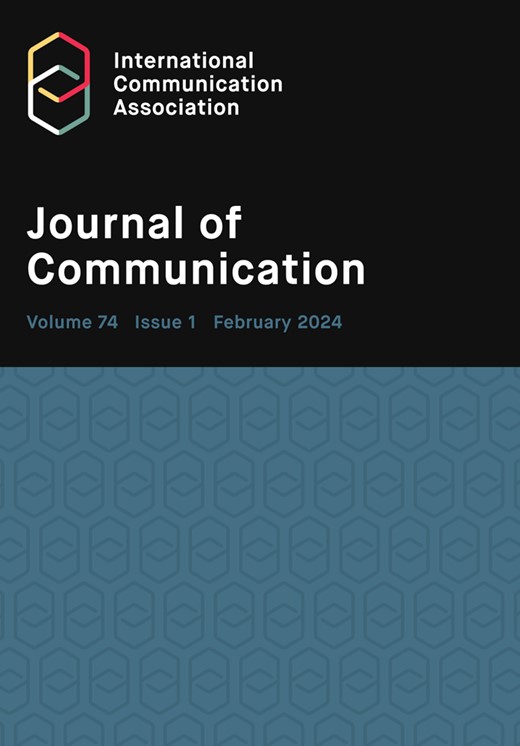Cultural Representation in International Media: Trends and Implications
IF 6.1
1区 文学
Q1 COMMUNICATION
引用次数: 0
Abstract
Purpose: The general objective of this study was to understand cultural representation in international media exploring the trends and implications. Methodology: The study adopted a desktop research methodology. Desk research refers to secondary data or that which can be collected without fieldwork. Desk research is basically involved in collecting data from existing resources hence it is often considered a low cost technique as compared to field research, as the main cost is involved in executive’s time, telephone charges and directories. Thus, the study relied on already published studies, reports and statistics. This secondary data was easily accessed through the online journals and library. Findings: The findings reveal that there exists a contextual and methodological gap relating to cultural representation in international media. Preliminary empirical review revealed that cultural representation in international media had significantly transformed over the past decade, driven by societal changes and demands for inclusivity. Despite progress, challenges remained in achieving equitable representation, especially behind the scenes. Positive trends had implications for social cohesion, economic outcomes, and individual self-perceptions, while persistent stereotypes and biased portrayals continued to undermine these benefits. The study emphasized the importance of ongoing efforts to promote diversity and accurate portrayals to foster a media landscape that truly reflects global diversity and contributes to understanding and social harmony. Unique Contribution to Theory, Practice and Policy: The Social Identity Theory, Cultivation Theory and Framing Theory may be used to anchor future studies on cultural representation in international media. The study recommended expanding theoretical frameworks to include intersectionality, critical race theory, and feminist theory to better analyze media representation. Practically, it advised media producers to adopt inclusive casting and storytelling practices, implement mentorship programs, and conduct regular diversity audits. Policy recommendations included stronger regulations and incentives for diversity, along with monitoring systemic biases. Specific industry strategies were suggested for different media sectors, such as collaborating with cultural consultants and designing algorithms to promote diverse content. Educational initiatives included integrating diversity courses in academic programs and providing bias training for professionals. Finally, the study emphasized the need for global collaboration and ongoing research to monitor trends and assess the impact of representation initiatives.国际媒体中的文化表述:趋势与影响
目的:本研究的总体目标是了解国际媒体中的文化表现形式,探讨其趋势和影响。研究方法:本研究采用案头研究方法。案头研究指的是二手数据或无需实地考察即可收集到的数据。案头研究基本上是从现有资源中收集数据,因此,与实地研究相比,案头研究通常被认为是一种低成本技术,因为主要成本涉及执行人员的时间、电话费和目录。因此,本研究依赖于已出版的研究、报告和统计数据。这些二手数据可通过在线期刊和图书馆轻松获取。研究结果:研究结果表明,在国际媒体的文化表现方面存在着背景和方法上的差距。初步实证审查显示,在社会变革和包容性要求的推动下,国际媒体中的文化代表性在过去十年中发生了显著变化。尽管取得了进展,但在实现公平代表性方面仍然存在挑战,特别是在幕后。积极的趋势对社会凝聚力、经济成果和个人自我认知产生了影响,而持续存在的陈规定型观念和有偏见的描述继续破坏着这些益处。该研究强调了持续努力促进多样性和准确描述的重要性,以促进真正反映全球多样性并有助于理解和社会和谐的媒体景观。对理论、实践和政策的独特贡献:社会认同理论、培养理论和框架理论可用于今后有关国际媒体文化表现的研究。研究建议扩展理论框架,纳入交叉性、批判性种族理论和女权主义理论,以更好地分析媒体的表现形式。在实践中,研究建议媒体制作者采用包容性的选角和叙事方法,实施导师计划,并定期进行多样性审计。政策建议包括加强对多样性的监管和激励,同时监测系统性偏见。针对不同的媒体部门提出了具体的行业战略,如与文化顾问合作,设计算法以促进多元化内容。教育措施包括将多样性课程纳入学术计划,为专业人员提供偏见培训。最后,研究强调了全球合作和持续研究的必要性,以监测趋势并评估代表倡议的影响。
本文章由计算机程序翻译,如有差异,请以英文原文为准。
求助全文
约1分钟内获得全文
求助全文
来源期刊

Journal of Communication
COMMUNICATION-
CiteScore
11.60
自引率
5.10%
发文量
41
期刊介绍:
The Journal of Communication, the flagship journal of the International Communication Association, is a vital publication for communication specialists and policymakers alike. Focusing on communication research, practice, policy, and theory, it delivers the latest and most significant findings in communication studies. The journal also includes an extensive book review section and symposia of selected studies on current issues. JoC publishes top-quality scholarship on all aspects of communication, with a particular interest in research that transcends disciplinary and sub-field boundaries.
文献相关原料
| 公司名称 | 产品信息 | 采购帮参考价格 |
|---|
 求助内容:
求助内容: 应助结果提醒方式:
应助结果提醒方式:


